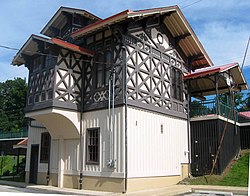Strafford, Pennsylvania
| Strafford, Pennsylvania | |
|---|---|
| Unincorporated community | |

Strafford SEPTA Regional Rail station
|
|
| Location within the state of Pennsylvania | |
| Coordinates: 40°03′03″N 75°24′16″W / 40.05083°N 75.40444°WCoordinates: 40°03′03″N 75°24′16″W / 40.05083°N 75.40444°W | |
| Country | United States |
| State | Pennsylvania |
| Counties | Chester, Delaware |
| Townships | Tredyffrin, Radnor |
| Time zone | Eastern (EST) (UTC-5) |
| • Summer (DST) | EDT (UTC-4) |
| ZIP code | 19087 |
| Area code(s) | 610 and 484 |
Strafford is an unincorporated community in the southeastern part of the U.S. state of Pennsylvania, located partly in Tredyffrin Township, Chester County, and partly in Radnor Township, Delaware County. It is served by its own stop on the SEPTA Paoli/Thorndale Line regional rail train. The SEPTA station at Strafford is one of the few buildings that survives from the 1876 Centennial Exposition at Philadelphia. It is also the site of the Strafford Friends School, and Old Eagle School. It is in the Eastern Standard time zone. Elevation is 440 feet.
The Philadelphia and Western Railroad once ran to Strafford but service on its main line was discontinued on March 23, 1956, while service on the former branch line continues as The Norristown High-Speed Line. The portion of the abandoned P&W line in Radnor Township, ending in Strafford, is now a "rail trail" multi-use path.
Students in Tredyffrin Township attend schools in the Tredyffrin/Easttown School District. High school students in Tredyffrin Township attend Conestoga High School.
The Tredyffrin Library, with 18,000 square feet (1,700 m2) of space as of 1977, is located in Strafford. The architectural firm Mitchell/Giurgola developed the Tredyffrin Library. It has an amphitheater that is focused on a park in a southward direction. The library has a single large reading room. The library building has a larger two story end, while the other end has only one story at the upper level. The facility has toilets, workrooms, and offices at the main level are in a separate element of the structure from the main reading room, and this structure juts out from the flue. Architectural Record said that this "allows direct access to the reading room from the public entrance."
...
Wikipedia

